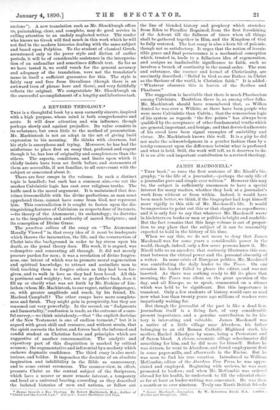A REVISED THEOLOGY.* Tins is a thoughtful book by a
man earnestly sincere, inspired with a high purpose, whose mind is both comprehensive and acute. It will draw attention and win influence, though perhaps slowly and against prejudice. Its value consists in its substance, but owes little to the method of presentation. Mr. Mackintosh is not an adept in the art of giving lucid expression to his meaning. He thinks with clearness, but his style is amorphous and trying. Moreover, he has had the misfortune to place first an essay that, profound and cogent though it be, has less of originality and completeness than the others. The aspects, conditions, and limits upon which it chiefly insists have been set forth before, and statements of them are accessible, if not familiar, to all conversant with the subject or concerned about it.
There are four essays in the volume. In each a distinct topic is handled; but each has a common aim,—to cut the meshes Calvinistic logic has cast over religious truths. The knife used is the moral argument. It is maintained that doc- trines irreconcilable with the divine perfections, as man must apprehend them, cannot have come from God, nor represent him. This contradiction it is sought to fasten upon the dis- tinguishing features of Calvinism as respects four of its tenets, —its theory of the Atonement ; its eschatology; its doctrine as to the inspiration and authority of sacred Scripture ; and its conception of Divine Grace.
The punetum saliens of the essay on " The Atonement Morally Viewed " is, that every idea of it must be inadequate which throws the incarnation, the life, and the resurrection of Christ into the background in order to lay stress upon his death, as the penal theory does. His work, it is argued, was redemptive and renovating all through. It did not merely procure pardon for men; it was a revelation of divine forgive- ness, one intent of which was to promote moral regeneration and spiritual knowledge, to attract and assimilate men to God, teaching them to forgive others as they had been for- given, and to walk in love as they had been loved. All this is pertinent and weighty ; but, not to go farther back, does it fill up or clarify what was set forth by Mr. Erskine of Lin- lathen (whom Mr. Mackintosh, to our regret, rather disparages), or, with greater amplitude and reach, by his friend, Dr. Macleod Campbell P The other essays have more complete- ness and finish. They might gain in perspicuity, but they are reasoned out very powerfully. In the second, on " Judgments and Immortality," confession is made, as the outcome of a care- ful survey,—we think mistakenly,—that " the explicit doctrine of the New Testament is one of endless torment ;" but it is argued with great skill and resource, and without strain, that the spirit corrects the letter, and forces back the informed and candid student on Christian facts and principles which are suggestive of another consummation: The analytic and expository part of this disquisition is marked by critical acumen ; the argumentative and inferential by a modesty which eschews dogmatic confidence. The third essay is also meri- torious, and bolder. It impeaches the doctrine of an absolute inspiration and infallibility in the Bible as unnecessary, and to some extent erroneous. The counter-view, in effect, presents Christ as the central subject of the Scriptures, which have a nearer or more remote interest, a temporary and local or a universal bearing, according as they described the isolated histories of men and nations, or follow out
• Essays towards a New Theology. By Robert Mackintosh, M.A., Author of "Christ and the Jewish Law." Glargow : James Maclehose and Sons.
the line of blended history and prophecy which stretches from Eden to Paradise Regained, from the first foreshining of the Advent till the fullness of times when all things shall be gathered together in Him, and the Kingdom of God be fully restored. The last essay is also a keen bit of polemic, though not so satisfactory. It urges that the notion of irresis- tible grace and final perseverance is a mechanical conception which, trusted in, leads to a fallacious idea of regeneration, and assigns an inadmissible significance to faith, such as involves a breach of continuity in the moral order. The sum and substance, the essence and kernel of Christianity, are succinctly described : " Belief in God as our Father, in Christ as the Saviour of the world, is Christian faith." It is added : " Whatever obscures this is leaven of the Scribes and Pharisees."
The suggestion is inevitable that there is much Pbariseeiem among Calvinists. Doubtless there is, as among other folks. Mr. Mackintosh should have remembered that, as Wilkes denied he was ever a Wilkite, so there have been people who were more Calvinistic than Calvin ; that the remorseless logic of his system as regards " the five points " has always been qualified by the acceptance of other fundamental truths which are general, important, and benign; and that devoted adherents of his creed have been signal examples of amiability and virtue. Mr. Mackintosh knows this well. It is a pity he did not make the acknowledgment in a gentler fashion than by a tetchy comment upon the difference betwixt what is professed and what is held. Still, the work will tell, as it deserves to do. It is an able and important contribution to a revised theology.














































 Previous page
Previous page